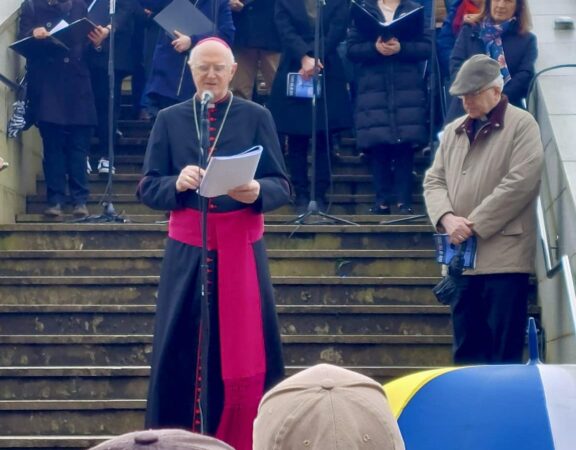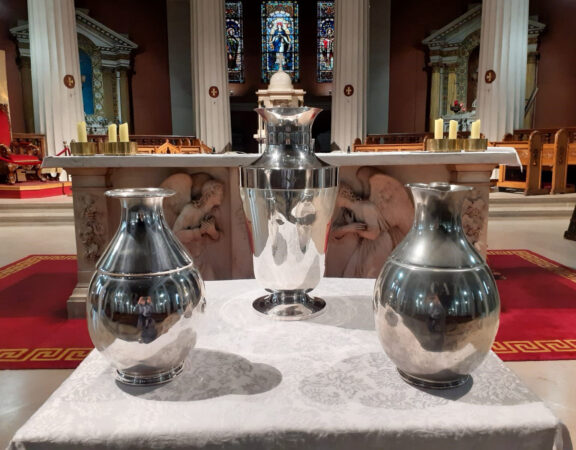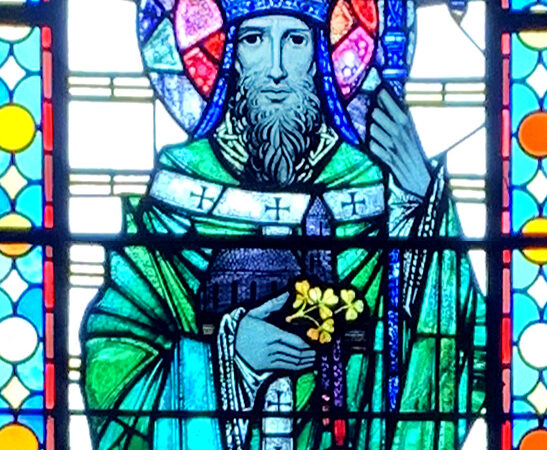WEEK OF PRAYER FOR CHRISTIAN UNITY 2005
Homily Notes of
Most Rev. Diarmuid Martin
Archbishop of Dublin
————-
Saint Finian’s Lutheran Church
“The foundation and presupposition of justification is in the incarnation, death and resurrection of Christ. Christ himself is our righteousness. By grace alone, in faith in Christ’s’ saving work and not because of any merit on our own part, we are accepted by God and receive the Holy Spirit, who renews our hearts while equipping and calling us to good works”
These are words of the historic Joint Declaration on the Doctrine of Justification by the Lutheran World Federation and the Roman Catholic Church. They remind us that our faith and our Christian life are not of our own construction. We belong solely to Christ: “we are Christ’s, and Christ is God’s” (1 Cor.3:23)
We give thanks to God for the fact that, in these recent years, we have moved forward so much on the path towards unity, even though the path still to tread is lengthy and even though in each generation new differences and tensions appear. The map of the terrain which we have successfully trodden and the signposts to the way forward are both the same: we must place at the centre of our practice our belief in the primacy of Christ’s saving work, never our own personal or confessional or even tribal understandings of what Christian belief and practice should look like.
When we accept the primacy of Jesus, we accept that it is he who designs the path which will brings us together, just as he will be the architect and the foundation of the edifice within which we will live out our unity. Each of us would like to be able to design that edifice in our own way, according to our own style and to maintain within it our own cosy corners, just as we have them today.
Letting Christ be the architect and entering then together into His edifice will inevitably involve the pain of abandoning our own comfortable structures. It will mean replacing our protected confessional security with the risk of allowing ourselves to come together within that new common home in which we may well feel unfamiliar and insecure.
Our disunity is a scandal. It is a scandal to believers and an obstacle to unbelievers. Our disunity hinders people who seek unity and hope in our world from looking towards Jesus, our peace, as a source of unity.
There is always a temptation to think that our moves towards unity will inevitably make us more popular in modern culture. The Letter to the Corinthians reminds us that those who look at us from outside may well consider the “true foundation” to contain structural faults when looked at with a cold rational glimpse. Christian Unity will never be the fruit of a flirtation with the fashions of the times; rather we have to be prepared to accept being called “fools” in the eyes of “the wisdom of this world”. (1 Cor 3:18-19). Allowing Christ’s saving power to have primacy in our hearts and our structures may not necessarily make us appear as enlightened to modern culture, no matter how much we might crave for such acceptance. We always have to have the courage to go against the stream, even to be considered and proclaimed “fools”.
We have travelled a long way together. The search for unity has in fact changed much within our own communities and how we relate to each other. We have become more open to other traditions of Christian piety, of forms of worship. We still however have our rivalries. There are still aspects of each other’s practice which at times amuse, at times irritate. We still behave in ways which reflect differing senses of confessional superiority. Our desire to be protagonists, our desire for a certain popularity, can be a blockage to enabling us to fully accept the primacy of Christ whose servants we are. Faith and unity in Christ are not the products of assertion or acquisition, but rather the fruit of self giving, of witness to a God who is the God of love. It is the gratuitous love of God which calls us to that special unity which is the mark of God’s children.
One of the important dimensions of this annual celebration for Christian Unity is to remind us that it is above all by praying together that we usher in the deepest form of unity. In prayer we place ourselves humbly before God, without asserting any merits of our own. It is above all in prayer that we recognise the primacy of Christ, the primacy of that gratuitous, saving love of our God, who in his son, Jesus Christ, loved us first and has given us both the law of charity and the ability to love gratuitously.
Historical differences, cultural differences and simple lack of knowledge and understanding of each other have built up barriers which will not come down easily. We have yet to work out just how much we can do together on the basis of our common baptism. We have yet to work out just how much we are obliged to do together as a result of our common baptism. We are too often afraid to engage together in efforts of evangelisation. We have to discover new forms of witness based on our common baptism, which will enable us to be “servants through whom our culture can be brought to belief” (cf. 1 Cor 3:5). This is an important challenge in modern Ireland.
This is important as new expressions of religious diversity emerge in Ireland. We have to once again in our history give new meaning to “United Ireland”, to the new kind of unity and Irish identity which will emerge as Ireland welcomes to its shores and into our communities peoples of many new cultures. As Christians we must work with all in our society to create a new religious and civil culture in Ireland. We must live out the particularity of our Christian belief. Indeed we must live out the integrity of our confessions and traditions. But we must do so in such a way that the Church of Jesus appears more clearly as sacrament of unity of the entire human race. The more we create unity within the human family – a rich unity which embraces many diversities – the more we are faithful to Christ. When we reinforce prejudice, disunity and division we cannot be said to be following Christ’s teaching.
This is important as we look at the peace process in Northern Ireland and at our responsibilities. I am struck since my return to Ireland at a tendency to think that the peace process in Northern Ireland is something primarily of the Churches in Northern Ireland, something that we look at, with support and prayers, encouragement and hope, but we look at from a distance. Northern Ireland is not another world. There is, yes, a new Northern Ireland identity, an identity of Christians who have matured in the hard school of reconciliation, from which we in the rest of Ireland can learn. There is also a responsibility for Christian believers in the rest of Ireland to be active participants in ensuring the success of the peace process, never just sitting however critically in our arm chairs. The peace process in Northern Ireland will require a new Church culture North and South. It must be a culture of Christian hope, springing from our common abandonment to the primacy of Christ.
This is important for the manner in which Churches in Ireland witness in the face of secularism. We all have reason to be satisfied with the statistics for belief in Ireland. Roman Catholics are happy that numbers, even though they have gone down, are still very high by European standards. Protestant and Orthodox communities can point to increases in membership. But statistics can be very deceptive. It would be foolish not to recognise that many of our people, even those who may still register as religious believers, are attracted, consciously or unconsciously, by a secularist view of life. We should not underestimate how a secularist viewpoint can be full of caring and service and be the source of meaning in people’s lives. The goodness of many young people may be less and less attributable to explicit Christian belief. For many young people the “primacy of Christ” in their lives is less and less a truly religious primacy.
We are still “persons of the flesh” (1 Cor 3:1). Saint Paul said that he had fed his disciples with “milk” and not on “solid food” since they were not ready for full nourishment. Today we have to be careful in the face of those who do not seem ready for the healthy solid food of belief in Jesus not to offer them “junk food”, which is not the recipe for mature growth, but rather satisfies false needs and creates further false needs.
If we all our convinced that Jesus is the one foundation then we have to ensure that people know who this Jesus is, that they encounter the true Jesus, that they encounter the message of Jesus in its entirety. We have to ensure that young people are not turned off from the message of Jesus by us, but also that they are led beyond the superficial religious sentiment to find hope and meaning in the integrity of the Christian message and its demands.
“Dialogue does not extend exclusively to matters of doctrine, but engages the whole person. It is also a dialogue of love.” (Ut unum sint, 47). The richness of our own encounter here this evening shows just how much our dialogue in love is important as a sign of our common faith and as a fruit of our commitment to Christ. The more we can develop that d









